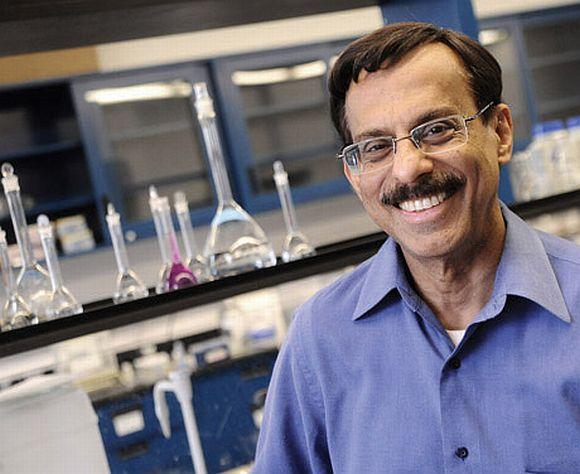P Somasundaran
The sixth of the special series on late Nobel laureate Dr Har Gobind Khorana
Part I: Dr Khorana, Nobel laureate and one of science's immortals
Part II: Dr Khorana: 'Considerate, most remarkable man'
Part III: Dr Khorana: 'A loving father, a caring mentor'
Part IV: A Nobel laureate salutes another
Part V: 'Dr Khurana never paid lip service to anyone'
We have come a long way in human civilization, but what beclouds our way of life today is that we are largely succumbed to or have inherited numerous genetic diseases, and the majority of them are dealt with the understanding we have. Some of them are or could be at subtle levels, symptomless, and therefore not diagnosable due to unavailability of routine diagnostic tools.
Some -- of all ages -- are perplexed and ignorant of their suffering -- such as due to autism. In many undeveloped countries, routine heath-care diagnosis protocols are hardly even capable or are aware to such consequences.
Amidst all this, we are indeed blessed that James Watson and Crick discovered DNA being the key element in us, driving our well-being and activities in our lives deep down -- probably in every respect.
Thus in our way of life, Dr Har Gobind Khorana's research work in understanding of the gene code is an invaluable contribution to genetic science, and an important area of research to be pursued for betterment of life in future.
I have strong belief that his contributions, especially the 'making of artificial genes', will lead to better understanding of the connections between the genetic architecture and its role in cell functioning, and most importantly, towards development of diagnostic tools not only for identification but also towards development of pathways for treatments.
In a slightly different context, certain proteins being not manufactured by cells is the root cause of many diseases, and is thus a major area of research in protein-deficiency related diseases.
In this regard, Dr Khorana's work -- how the genetic code determines all life processes by directing the synthesis of all cell proteins -- is indeed a huge breakthrough in biochemistry and cell biology. With all this, he made multifaceted contributions making the spectrum of genetic engineering and personalised medicine research more illuminated to go forward.
With hope for a better way of life, it is a feeling of relief that at least today it is possible to treat genetic diseases either by repairing the defective gene or by introducing normal functioning genes. This has also led to the development of diagnostic tools for inherited human diseases, cancer, and AIDS, and understanding of various protein-deficiency diseases.
Dr P Somasundran is the La von Duddleson Krumb Professor at Columbia University's Department of Earth and Environmental Engineering. His postdoctoral research associate Dr P Partha contributed to this article.
...
'Contribution that changed the course of science'
The University of Wisconsin, where Dr Khorana worked for 10 years, as well as MIT, which he was associated with as professor emeritus till his death, pays glowing tributes to the late Nobel laureate.
'Gobind was a brilliant, path-breaking scientist, a wise and considerate colleague, and a dear friend to many of us at MIT,' said Dr Chris Kaiser, MacVicar Professor of Biology and head of the Department of Biology at MIT.
The University of Wisconsin pointed out that he 'was among the pioneers of the now-familiar series of three-nucleotide codons that signal to the cell which amino acids to use in building proteins -- for example, uracil-cytosine-uracil, or UCU, codes for the amino acid serine, while CUC codes for leucine.'
'He revolutionised biotechnology with his pioneering work in DNA chemistry,' said Dr Aseem Ansari, UW-Madison professor of biochemistry. 'The work that he did in Wisconsin from 1960 to 1970 continues to propel new scientific discoveries and major advances.'
Dr Khorana returned to Wisconsin for the last time in 2009, for a symposium held in his honour. Speakers included three Nobel Laureates in addition to Dr Khorana, and many other world-renowned scientists.
'It was an unbelievable gathering of scientific intelligentsia, and they all came to pay tribute to him,' said Ansari, who helped organize the event. 'They described how his work had influenced their thinking and the current advances being made in exciting world of synthetic biology.'
Inspired by Dr Khorana's story, in 2007, UW-Madison faculty members Ansari and Ken Shapiro established the Khorana Scholars Programme to enable the exchange of top students between select Indian research institutions and the UW-Madison.
'He served as an icon for why international programs are so important,' Ansari said. 'He personified the Wisconsin Idea, the idea of knowledge without boundaries. Here was a man who came from a poor rural Indian family, working in Wisconsin, making a contribution that changed the course of science.'
Click on MORE to read earlier series...



article